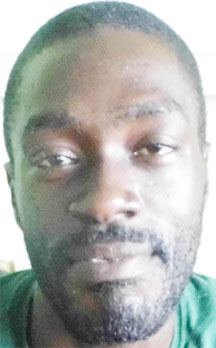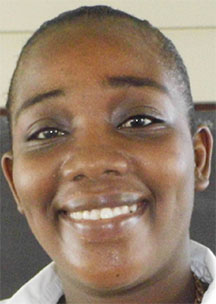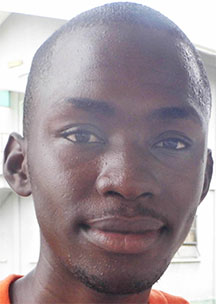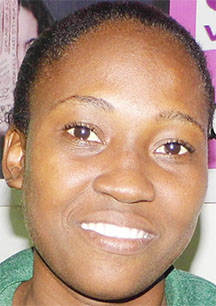World AIDS Day is being observed today internationally under the theme ‘Closing the Gap’. We asked Berbicians who are involved in the campaign to reduce stigma and discrimination attached to persons infected by and affected with HIV/AIDS to comment on what is being done in the county and whether it has made a positive impact. Their comments follow:
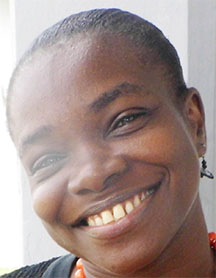
Ualita Isaacs, Social Worker, Comforting Hearts NGO – ‘Basically my role as a social worker is getting persons to understand the effects of stigma and discrimination in that, even though, they have been diagnosed with HIV it is not the end of the world. They still need love, comfort, care, food, clothing and shelter, because they are still first and foremost an individual. In Comforting Hearts, we have been sensitizing persons on the effects of stigma and discrimination. We would go to workplaces and have sessions. We would talk to police officers. We would also meet with health care workers. I do think it has had an impact, in that, persons who are infected are bolder now – they are saying that they are infected. Persons have moved away from shunning persons and are embracing them.’
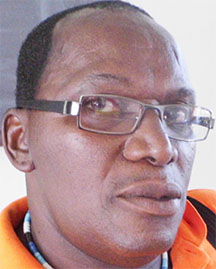
Uriel Dey, Education Advocate, United Brick Layers NGO – ‘I’m an education advocate attached to United Brick Layers. We deal with mostly the key populations, e.g. commercial sex workers. We go out into the fields and engage them in conversations. We educate them on how they can contract HIV and how it’s being spread. So far it has been a wonderful experience, but there are still some challenges because there are still some myths out there and persons are still not knowledgeable about the spread of HIV. They basically looking at sex; but it’s not only about sex, there are other modes of transmission that persons don’t really consider. So we educate them. So I would say to some extent yes the campaign is having an effect, but it’s two- fold. At the end of the day while you are out there you are still meeting persons who are ignorant of the fact, because persons don’t always find the time to pick up a literature or read the newspaper to learn about this. It’s not affecting them, it’s not related to them or they were never really connected to someone who was infected or affected with HIV and AIDS. So for them it’s a no-no. So there is still ignorance out there.’
Kayonda Grant, Social Work Student, UG Berbice Campus – ‘For me I think the sensitization drive on HIV/AIDS has made some impact because persons seem to be more educated. We have the stigmas still attached to HIV/AIDS because many persons who are not educated, see it as a sight to sore eyes as we could say. But we have a lot of programmes and as we go along, people are being educated. So the stigma is reducing. We encourage persons to do the HIV test so that they can know their status. And basically we keep reinforcing that it can happen to anyone.’
Alessandra Hereman, Peer Educator, United Brick Layers NGO – ‘First of all I should say that in Guyana homosexuality is illegal. We are not very tolerant to certain things but people do listen. From our experience going out there in our HIV prevention education, people do listen. They know that this is a real issue and they listen. I’m a peer educator and social change advocate. Basically our programme targets key population: men who have sex with men, commercial sex workers and transgender – individuals whose lifestyles and behaviour increases their susceptibility of becoming infected. So we carry out regular outreach sessions where we go at hot spots, hotels, nightclubs to reach key populations. Key populations are integral in the prevention and treatment of HIV. So we try to send them the HIV message. The message does have an impact on the public. So I wouldn’t say the stigma is still high. We have gone a far way.
We have had several workshops and advocacy programmes where we were able to sensitize people especially duty bearers like the police officers and nurses on the rights of individuals especially the sexual minority, transgender and sex workers. So making them aware of the issues has had an impact.’
Garfield Grant, Project Coordinator, Comforting Hearts NGO – ‘Comforting Hearts has been working for a long time with persons affected by or infected with HIV/AIDS in both Regions 5 and 6. To that end, the organization would have conducted a number of sensitization sessions, rallies, TV programmes, campaigns trying to edify persons as to how to eliminate stigma and discrimination attached to HIV/AIDS. Of course there is still stigma in the communities and this can prevent persons who actually need care and support from coming forward. Some persons think that if they come forward persons might look at them and think different. Or if they are employed at a certain place, or a particular office and persons know their status, they can lose their job or persons might start treating them differently. This would prevent persons from trying to access the care and support that our organization offers. As a result of not
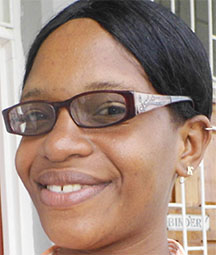
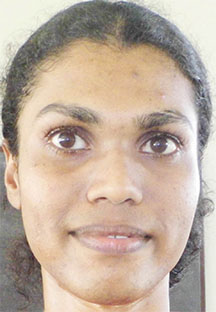
accessing care, persons’ health can deteriorate rapidly. We have come a long way, but a lot of work remains to be done.’
Budwatty Ramnarine, Social Work Student, UGBC – ‘In my area stigma and discrimination have reduced a lot. In my community there are like one or two people whose HIV status is known and everybody intermingles. Everybody works together to help those infected individuals. One of the infected persons, doesn’t have a mother, a father, nor siblings; he is alone. But whenever he needs medical attention his neighbours take him to the hospital. So we can say that society is more accepting. You will find that we go around and talk to the young people and they listen. What we tell them they adhere and follow and try to avoid some types of sexual behaviours that would put them at risk.’
Denzel Crawford, Counsellor/Tester, Comforting Hearts NGO – ‘Some of the activities Comforting Hearts would have been involved in over the years include candlelight vigils and rallies to increase awareness about HIV/AIDS and other sexually transmitted infections, as well as to show solidarity for people living with HIV and remembering those who have died as a result of the illness. We also hold symposiums, TV programmes and quizzes for schools. Clearly it has reduced a lot and I can say that confidently. Since the first reported case in Guyana in 1987, we see now that persons are openly revealing their status. They are so bold they can go and make documentaries showing their faces and saying well look I’m living with HIV and these are some of the things that I’ve been going through. To go a little beyond HIV, even persons who are so-called key populations who are at risk of contracting HIV, they are much more open about saying to the public you know, I am gay or I am a transgender, for example. Around 1992, 1993 around those years, this would have been something that seemed as totally impossible. So the fact that people are open and can come out and say what they are, clearly indicates to me that stigma and discrimination is definitely decreased. However, that does not go to say that stigma is not there. It is still high, but it has decreased. So it’s important for us to keep up the fight.’
Shivaughn Burrowes, Counsellor/ Tester, United Brick Layers NGO – ‘Despite all the work we do and the campaigns we carry out, I think stigma and discrimination against those who are either affected or infected with HIV is high. And this stigma is really damaging on both ends. For people who are HIV negative, stigma sometimes stops them from getting tested. Especially if they feel they did anything that put them at risk, they may not want to get tested because the result may be hard to bear. On the other end, I think it also stops people from interacting with those living with HIV. People just look at you and point fingers and says oh that person is HIV infected. So it stops people from going to the doctor or seeking treatment, because that’s admitting they have the virus. But as a counsellor I must say that sometimes the stigma is self-imposed, out of shame and guilt. Stigma’s biggest problem is that it inhibits open communication, and if persons don’t feel comfortable talking about sex, HIV and other related issues you won’t be able to meaningfully engage them in dialogue that would help reduce said stigma.’
David Schultz, Social Work Student, UGBC – ‘To some extent, efforts have been fruitful in reducing stigma and discrimination attached to persons with HIV, but on the other hand more work needs to be done. When you look at some cultural aspects like the Rastafarians within our society, I believe they discriminate a lot against persons with HIV in our communities and even homosexuals. And people still have this fear of HIV infected persons, like if I’m infected with HIV/AIDS they don’t want nothing to do with me. Even though, you cannot get the disease just by
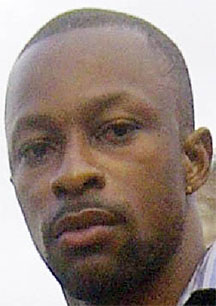
interacting with persons or just by touching and stuff. But I think a lot has been done over the years. I mean the ministries of Education, Health and Human Services all have been playing a part in helping to sensitize the public. And even to social work students within the University of
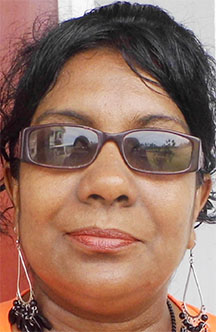
Guyana, we have been sensitizing persons. We have numerous sessions on and off campus where we talk to persons about HIV/AIDS and domestic violence and other issues. So I think work has been done and people have had a change of mind and change of view towards people with HIV in Guyana.
Alana Nelson, Home-Based Care Giver, Comforting Hearts NGO – ‘Stigma and discrimination on the whole, I don’t think it has reduced. In the work that I do, if I go out there, anybody that comes in contact with this building is labelled as having HIV. So people don’t want to come here because persons pointing fingers to say they HIV positive. I work with persons particularly children who are either living with HIV or are affected by HIV. We encourage them to find themselves back into society and not to listen to what people may say and confine themselves in solitude. Some people are fearful, if they go out there, they will be discriminated against. Some of the clients say when they go to look for jobs and people know they are HIV positive they are not given the job. Then you have those who people speculate are HIV positive and they are discriminated against too. So some of them just stay home and allow themselves to be depressed. So yes, there is still stigma and discrimination, especially in the workplace.’
